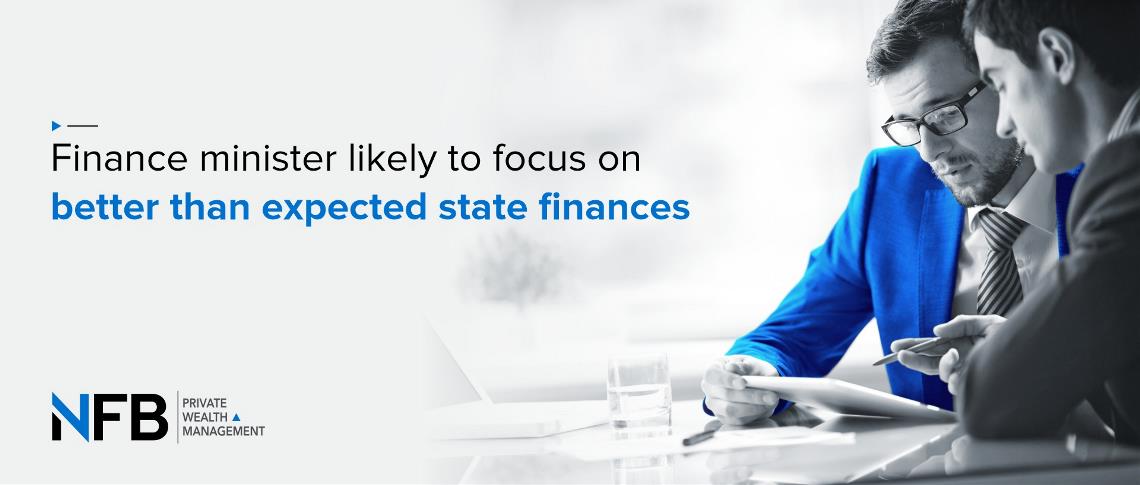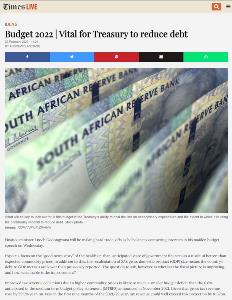Finance minister likely to focus on better than expected state finances
Minister Godongwana will deliver South Africa's Budget Speech on 23 February 2022. These are the important issues he is likely to address.


Finance minister Enoch Godongwana will be making some hard trade-offs as he balances competing interests in his maiden budget speech taking place later this week.
Expect a focus on the ‘good news story’ of the healthier than anticipated state of government finances as a result of the better than expected commodity prices. In addition to this, the recalculation of South Africa’s GDP size means that the country’s debt to GDP metrics are lower than previously reported. The question to ask, however, is whether the fiscal picture is improving, and how sustainable the improvement is?
Improved tax revenue collections as a result of higher commodity prices is likely to mean a smaller budget deficit than the 6.6% anticipated in the Medium Term Budget Policy Statement announced in November 2021. Given that gross tax revenue rose by 29.5% year-on-year in the first nine months of the 2021/22 year, tax revenue could well exceed this projection by R132 billion.
Although Godongwana has said that government is committed to reducing the budget deficit and stabilising the debt-to-GDP ratio, what will be key to look out for in this budget is Treasury’s ability to hold the line on unnecessary expenditure and the extent to which it is using the commodity windfall to reduce debt.
The reality is that South Africa’s debt service costs are rising every year, threatening to crowd out social spending. As Michael Sachs, adjunct professor of economics at Wits and a former head of National Treasury’s budget office pointed out at a recent Financial Mail event, South Africa should have been using the commodity boom – and its improved fiscal state – to build up a buffer for the inevitable slump in commodity prices.
South Africa already has high borrowing costs. As interest rates rise this debt becomes even more expensive and high interest rates on government debt dissuade fixed investment.
The problem in South Africa is that the state is not always using the money it borrows particularly wisely. Borrowings are acceptable when the money is being used strategically to grow the economy’s rate of growth. Herein lies the challenge. South Africa’s economic growth is expected to slow materially over the next few years, back towards the 1,5% level. South Africa will not broaden its tax base if this is the case. If the current tax windfalls slow down, the challenge of fiscal pressure will resume.
The only way out of this spiralling debt trap is economic growth – ideally at a multiple of population growth. However, without implementing meaningful structural reforms and addressing the state’s finances, economic growth will be lacklustre at best, exacerbating the high rate of unemployment. The IMF predicts growth of just 1.4% in the next few years with growing public debt. Its recently published annual report on South Africa says the country could increase its growth rate to more than 3% if it was to put reforms in place.
The IMF has warned that government’s support for embattled state owned enterprises is likely to be higher than planned, further jeopardising the state’s finances. Acknowledging the fiscal risk state owned enterprises pose to the economy, the IMF has recommended a range of reforms for state owned enterprises. Ironically, most of these recommendations are not new and have been promised by government in the past.
The IMF also doesn’t believe that the state will be able to honour its commitment to rein in the public sector wage bill.
In his State of the Nation Address (SONA) earlier this month, President Cyril Ramaphosa announced that the Covid-19 social relief grant of R350 has been extended to end March 2023.
Government has been under enormous pressure to introduce a basic income grant. There is, however, an acknowledgment that the country does not currently have the fiscal space to introduce a basic income grant and that doing so would pose a risk to the economy.
South Africa already spends 3.3% of its GDP on social expenditure which is high in comparison to other emerging marketing economies.
As far as tax hikes are concerned, it is unlikely that there will be vat rate hike announced. A year ago former finance minister Tito Mboweni announced that the corporate tax rate would be reduced by 1% to 27% in 2022. However, no mention of this change was made in the medium term budget which raises the question of whether it remains on the agenda.
Tax brackets were increased by 5% last year which was more than inflation, making it unlikely that there will be significant changes this year. Other tax matters to keep an eye on include the fact that tax breaks on retirement savings could be raised.
In the 2021 budget speech Mboweni said Treasury was relooking regulations around the tax treatment of home office expenses. This would be a welcome amendment as the requirement to claim home office expenses are currently fairly stringent.
Those who will be looking to Godongwana’s maiden budget for innovative ideas on how to get South Africa back on a sound fiscal path are likely to be disappointed. But at the same time, there is cautious optimism that the finance minister will endeavour to hold the line when it comes to not hiking taxes and trying to contain expenditure.
| This article was published by by Times Live. You can access their coverage here: |
|
 |
|













